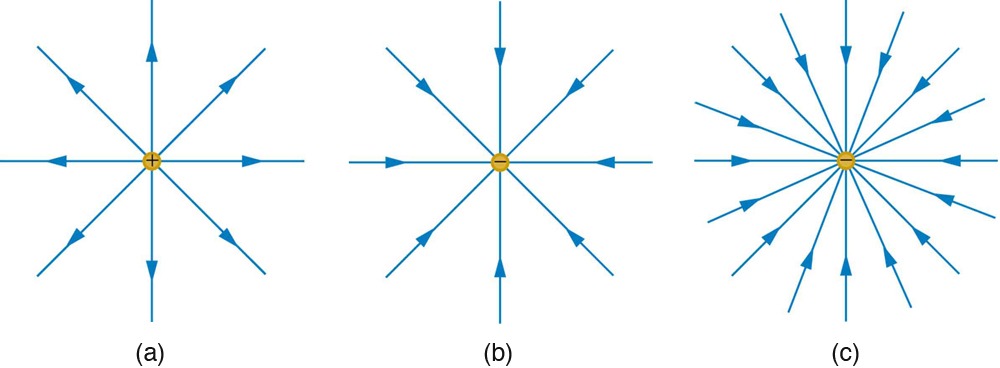| << Chapter < Page | Chapter >> Page > |
Note that the electric field is defined for a positive test charge , so that the field lines point away from a positive charge and toward a negative charge. (See [link] .) The electric field strength is exactly proportional to the number of field lines per unit area, since the magnitude of the electric field for a point charge is and area is proportional to . This pictorial representation, in which field lines represent the direction and their closeness (that is, their areal density or the number of lines crossing a unit area) represents strength, is used for all fields: electrostatic, gravitational, magnetic, and others.

In many situations, there are multiple charges. The total electric field created by multiple charges is the vector sum of the individual fields created by each charge. The following example shows how to add electric field vectors.
Find the magnitude and direction of the total electric field due to the two point charges, and , at the origin of the coordinate system as shown in [link] .

Strategy
Since the electric field is a vector (having magnitude and direction), we add electric fields with the same vector techniques used for other types of vectors. We first must find the electric field due to each charge at the point of interest, which is the origin of the coordinate system (O) in this instance. We pretend that there is a positive test charge, , at point O, which allows us to determine the direction of the fields and . Once those fields are found, the total field can be determined using vector addition .
Solution
The electric field strength at the origin due to is labeled and is calculated:
Similarly, is
Four digits have been retained in this solution to illustrate that is exactly twice the magnitude of . Now arrows are drawn to represent the magnitudes and directions of and . (See [link] .) The direction of the electric field is that of the force on a positive charge so both arrows point directly away from the positive charges that create them. The arrow for is exactly twice the length of that for . The arrows form a right triangle in this case and can be added using the Pythagorean theorem. The magnitude of the total field is
The direction is
or above the x -axis.
Discussion
In cases where the electric field vectors to be added are not perpendicular, vector components or graphical techniques can be used. The total electric field found in this example is the total electric field at only one point in space. To find the total electric field due to these two charges over an entire region, the same technique must be repeated for each point in the region. This impossibly lengthy task (there are an infinite number of points in space) can be avoided by calculating the total field at representative points and using some of the unifying features noted next.

Notification Switch
Would you like to follow the 'College physics for ap® courses' conversation and receive update notifications?